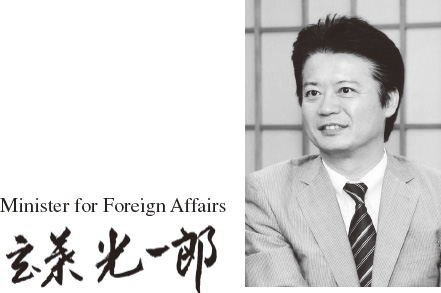Japan's Official Development Assistance White Paper 2011
Foreword
Since assuming the post of Minister for Foreign Affairs, I have done my utmost to advance a results-oriented, "substantial diplomacy" aimed at realizing steady progress. Official development assistance (ODA) is a vital means to achieving concrete results in our efforts to reduce poverty, enable sustained growth, address environmental issues, and resolve the variety of other problems faced by developing countries.
Following the Great East Japan Earthquake, I had the opportunity to see the many pictures sent by children from all over the world to encourage Japan. It gave me the deep sense that behind the goodwill and encouragement we received from around the globe was significant trust and a feeling of solidarity with Japan. I believe that this has been fostered by the accumulation of Japan's steady efforts to achieve peace and development throughout the world. The Great East Japan Earthquake gave me a renewed sense of the strong interdependence between Japan and the world. Today, as globalization advances and interdependence increases, national interests cannot be served unless the benefit of the world as a whole is achieved. Based on her many years of experience at the site of international cooperation, Sadako Ogata has said that "the concept of Japan as a 'solitary island of prosperity' that profits only Japan no longer applies."
Accordingly, ODA provides a way to achieve the benefit of the entire world, or in other words, to serve both national and international interests. When implementing ODA, it is important to take into consideration the basic concept of "human security," which enables a nation and its society to develop, specifically through the blossoming of the abilities of each person. Further, I believe that Japan must take the initiative to work toward achievement of the Millennium Development Goals and address disaster prevention, peace-building, promotion of worldwide green growth, and the various other issues that are faced on a global scale. It is also necessary for us to consolidate our overall strength to move ahead with international cooperation, while enhancing cooperation with emerging nations that have been showing a rapidly increasing presence in recent years. In accordance with this thinking, I have advocated promotion of "full-cast diplomacy," in which the national government, local municipalities, NGOs, small and medium-sized companies and other private businesses, individuals, and a variety of other organizations cooperate to create a synergistic effect.
The initial FY2012 ODA budget formulated by the Ministry of Foreign Affairs has opened the way to reversing the direction of the ODA budget that had decreased by half over the past 14 years, through measures such as increasing the budget for grant aid. Since early times, the Japanese people have held dear the belief that "the mercy you have for others is mercy you receive yourself," and that "he who gives to another bestows on himself." ODA is not merely "mercy." It is an international obligation. We intend to continue utilizing ODA strategically and effectively to contribute to the achievement of international interests, thereby further serving Japan’s national interests as well.
March 2012

